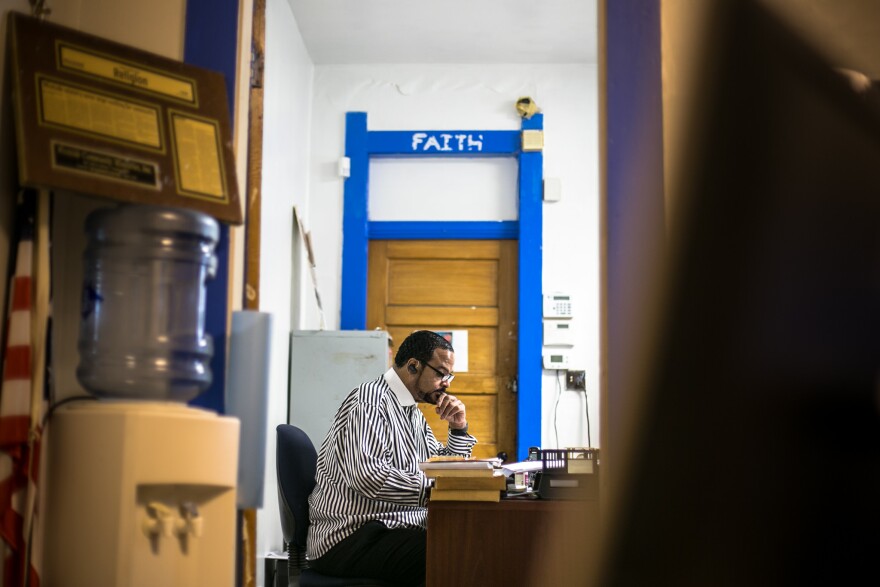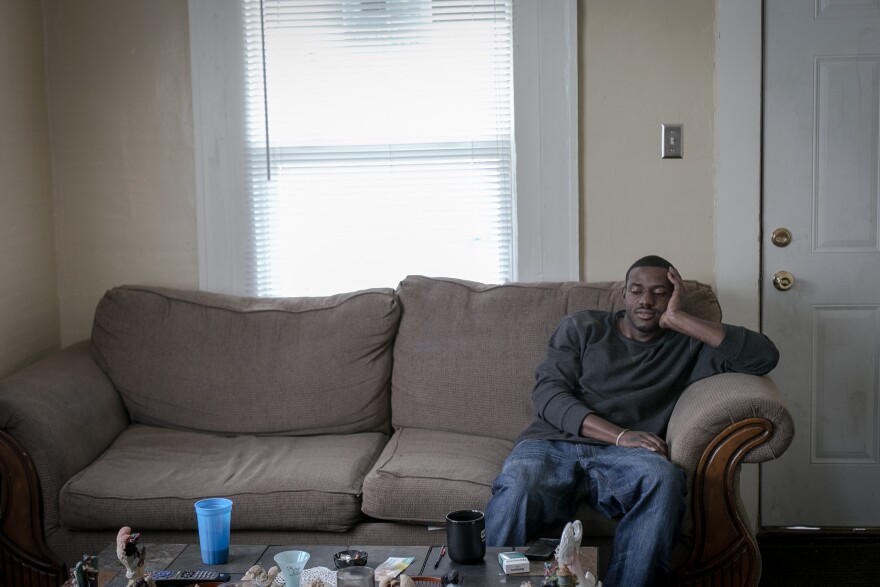It’s a brightly blue-painted building on a corner in Haughville, a near westside Indianapolis neighborhood that’s one of the city’s most violent. There’s no sign outside, but enter through a chainlink fence and then a worn door and you’ll find Jason Ward.
He’s tall, with slicked hair, and walks with a limp, at times bumping into the furniture in his modest office. There are much larger re-entry programs in Indianapolis than this, but for Ward, it’s his constantly ringing phone and these two rooms behind a corner store.
This was a bar when Ward bought it nearly 30 years ago. He made money from the bar, and he became an alcoholic there, too. But when he got sober, Ward found a new calling. He turned the ramshackle building into a re-entry center in the mid-1990s and runs a snack and cigarette stand up front, which employs some of the ex-felons he aids. Now he provides tutoring, financial counseling and job placement for young adults coming out of prison.

Ward tries to drive a positive mentality into the people he serves. That incremental improvements, like a bank account or a job, go a long way. “And then some of your worries may not be over with, but you do have a chance that you can overcome this,” he says between phone calls.
Early exposure to counseling and services, now beginning to start years before a felon is released, is an important part of keeping an offender from returning to crime. Studies show well over half of them will reoffend. Even with lots of help, they face incredible barriers -- from employment to mental health, education and addiction -- to start their lives over.
The younger a person is the first time they commit a crime, the higher the likelihood they’ll return to prison, a place that doesn’t help a teenager get straight, Ward says; “it’s nothing but to make you worse. Especially someone that young.”
Steven Buford is one of the people Ward is helping at Westside Community Ministry. He’s 25 and well-tattooed, some of the ink work his own.

Buford went to prison the first time at 18 on an armed robbery conviction. He says he was hanging out with the wrong people at the wrong time. But getting locked up only exposed him to more bad influences, and over the next six years, he cycled in and out of prison, serving his last sentence for theft.
“I didn’t have no goals or anything really set in my life at the time,” he says. “I was already just looking for something to cling on to, a boy or a man, or a gang or something, just looking for a little guidance or something. I was just out there wandering around.”
Buford gets excited easily, but his wide smile quickly fades when he starts talking about his struggles. He’s dealt with depression -- a common problem for ex-felons -- and he says he feels burdened by pressures to provide for himself, troubles with his family, and raising a baby girl.
“It just weighs on me. I feel like I gotta do more, and I’m 25 and I ain’t got too much done,” he says. “I feel like I should be ahead in life.”
He’s far behind. He didn’t finish high school, and he doesn’t have a driver’s license. On top of that, Ward says many employers shy away from ex-felons like Buford.
“Steven has a robbery conviction, which is a hellified thing,” Ward says. It takes eight years for Burford’s charges to be eligible for expungement, wiped off his record. It’ll take that long for Buford, Ward says, “for him to even get a fair chance.”
Buford has been out of prison since the summer of 2014, which means nearly seven more years before he can try to get the convictions erased from his record, seven more years of a hard time getting by. He’s strung together some work, but they’re mostly temp warehousing positions on the outskirts of the city, and only last a few weeks.
He had worse luck at businesses around the west side. “They say, ‘your background.’ They see my paperwork and it’s like ‘that’s crazy.’ It really bothers me though sometimes, but I can’t give up,” he says.
He complains of headaches and dizziness and trouble focusing because of ADHD and other neurological problems, and he says they make it difficult for him to work the few long hours he’s been able to find. Ward has tried to find employment for Buford that incorporates his art skills.
“If I find something that actually suits me, I’m in it,” Buford says, “instead of me just keep getting knocked off my feet.”
Lately, though, he’s been doing odd jobs, hauling scrap metal for a guy in the neighborhood. But it doesn’t pay much. “Hundred dollars don’t get you nowhere, a couple hundreds don’t get you nowhere,” he says. “Especially when you got to buy Pampers and formula.”
Buford is trying to get back on the disability assistance he lost when he went to prison. While it means he can’t work a formal job, it’s one of the few social programs he’s eligible for. It’s almost impossible for ex-felons to get other assistance like food stamps or subsidized housing.
Buford has found housing, moving into a home a few blocks from Ward’s Haughville office with his girlfriend and their six-month-old daughter.
“Building my foundation, right here, building it, trying to make it solid, hard rock,” he says in the living room one afternoon. “I can always come here. There’s food in the refrigerator. You can never just say I’m suffering if your bills (are) paid and you got food in your refrigerator.”
Buford’s girlfriend is older, and she’s an ex-felon, too. But she’s a positive influence on Buford. He says she keeps him straight. Her steady paycheck, from a job at Ward’s corner store, is a big help. It’s also where the two met, striking up conversation after he bought her a bag of chips.
After a tour of his new house, Buford reflects on what it will take for him to stay here long term, and not in a prison cell.

“Oh, I ain’t even thinking about going back,” he exclaims. “I ain’t thinking about going back, but what would it take? To get to work. Just something, a job or something. Money.”
Just setting the intention not to return to prison is a major mental hurdle to clear, re-entry experts say. “If you don’t have that mindset, you aren’t necessarily going to be successful,” says Julie Fidler, who works on housing issues in the Mayor’s Office of Ex-Offender Re-Entry.
About 9,000 people will leave a state prison this year and return to Indianapolis, according to the re-entry office. According to Fidler’s tracking, many ex-offenders settle in one of the city’s six “focus area” neighborhoods, identified by public safety officials for their high rates of violent crime and blight. One of them is Haughville, the neighborhood where Buford grew up, and where he’s now trying to make it. They’re far from ideal places to turn a life around.
“If there’s a lot of unkempt abandoned homes, and high weeds and grass, and trash laying around, and nobody cares enough to even pick it up, why do I, as a re-entrant, have any cause to have any hope?” Fidler says.
Indianapolis police found that 84 percent of the suspects they arrested last year for criminal homicide had a criminal history, a statistic that’s rising. So rehabilitating criminals is key to preventing killings. Brian Reeder, the city’s director of re-entry, says that must happen well before a criminal is released from prison and long after they get home.
“If you rehabilitate a person to the point that they are even thinking about changing their lifestyle, and then they come back into the community and they’re forced back into a dysfunctional situation and we haven’t addressed those systemic issues,” they’re highly likely to reoffend, Reeder says.
“There are a lot of things that go beyond just a person getting out of prison and starting on the road to quote-unquote ‘recovery,’” he says.
It took Steven Buford a long time to reach the tipping point toward recovery. But without work, he spends a lot of idle time at home. He’s trying to put himself in the right situations and evolve from his past.
“Then again, I could have just stayed out of trouble.” he says. “It would have been different, like I could have been somebody, even better. I wouldn’t have to deal with this. I would be a whole completely different person.”

But trouble is still there, which for Buford, is smoking marijuana.
He got caught in February for possession of marijuana and driving without a license. He’s hoping to avoid prison time and it’s probable he’ll just serve probation. But given his record, it’s a felony offense that could send him back to prison for a year.


